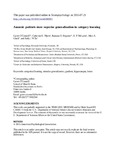Amnesic Patients Show Superior Generalization in Category Learning
| dc.contributor.author | O'Connell, G | |
| dc.contributor.author | Myers, CE | |
| dc.contributor.author | Hopkins, RO | |
| dc.contributor.author | McLaren, RP | |
| dc.contributor.author | Gluck, MA | |
| dc.contributor.author | Wills, Andy | |
| dc.date.accessioned | 2016-08-08T16:47:26Z | |
| dc.date.available | 2016-08-08T16:47:26Z | |
| dc.date.issued | 2016-11 | |
| dc.identifier.issn | 0894-4105 | |
| dc.identifier.issn | 1931-1559 | |
| dc.identifier.uri | http://hdl.handle.net/10026.1/5227 | |
| dc.description.abstract |
OBJECTIVE: Generalization is the application of existing knowledge to novel situations. Questions remain about the precise role of the hippocampus in this facet of learning, but a connectionist model by Gluck and Myers (1993) predicts that generalization should be enhanced following hippocampal damage. METHOD: In a two-category learning task, a group of amnesic patients (n = 9) learned the training items to a similar level of accuracy as matched controls (n = 9). Both groups then classified new items at various levels of distortion. RESULTS: The amnesic group showed significantly more accurate generalization to high-distortion novel items, a difference also present compared to a larger group of unmatched controls (n = 33). CONCLUSIONS: The model prediction of a broadening of generalization gradients in amnesia, at least for items near category boundaries, was supported by the results. Our study shows for the first time that amnesia can sometimes improve generalization. (PsycINFO Database Record | |
| dc.format.extent | 915-919 | |
| dc.format.medium | Print-Electronic | |
| dc.language | en | |
| dc.language.iso | en | |
| dc.publisher | American Psychological Association | |
| dc.subject | categorical learning | |
| dc.subject | stimulus generalization | |
| dc.subject | gradient | |
| dc.subject | hippocampus | |
| dc.subject | lesion | |
| dc.title | Amnesic Patients Show Superior Generalization in Category Learning | |
| dc.type | journal-article | |
| dc.type | Journal Article | |
| dc.type | Webcast | |
| plymouth.author-url | https://www.webofscience.com/api/gateway?GWVersion=2&SrcApp=PARTNER_APP&SrcAuth=LinksAMR&KeyUT=WOS:000387242200003&DestLinkType=FullRecord&DestApp=ALL_WOS&UsrCustomerID=11bb513d99f797142bcfeffcc58ea008 | |
| plymouth.issue | 8 | |
| plymouth.volume | 30 | |
| plymouth.publication-status | Published online | |
| plymouth.journal | Neuropsychology | |
| dc.identifier.doi | 10.1037/neu0000301 | |
| plymouth.organisational-group | /Plymouth | |
| plymouth.organisational-group | /Plymouth/Admin Group - REF | |
| plymouth.organisational-group | /Plymouth/Admin Group - REF/REF Admin Group - FoH | |
| plymouth.organisational-group | /Plymouth/Faculty of Health | |
| plymouth.organisational-group | /Plymouth/Faculty of Health/School of Psychology | |
| plymouth.organisational-group | /Plymouth/REF 2021 Researchers by UoA | |
| plymouth.organisational-group | /Plymouth/REF 2021 Researchers by UoA/UoA04 Psychology, Psychiatry and Neuroscience | |
| plymouth.organisational-group | /Plymouth/Research Groups | |
| plymouth.organisational-group | /Plymouth/Research Groups/Institute of Health and Community | |
| plymouth.organisational-group | /Plymouth/Users by role | |
| plymouth.organisational-group | /Plymouth/Users by role/Academics | |
| dc.publisher.place | United States | |
| dcterms.dateAccepted | 2016-05-25 | |
| dc.identifier.eissn | 1931-1559 | |
| dc.rights.embargoperiod | No embargo | |
| rioxxterms.versionofrecord | 10.1037/neu0000301 | |
| rioxxterms.licenseref.uri | http://www.rioxx.net/licenses/all-rights-reserved | |
| rioxxterms.licenseref.startdate | 2016-11 | |
| rioxxterms.type | Journal Article/Review |


